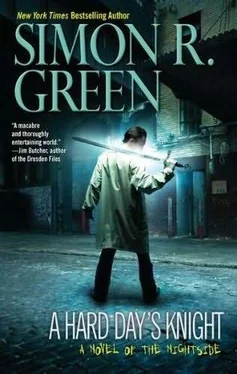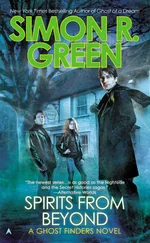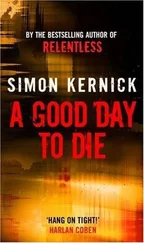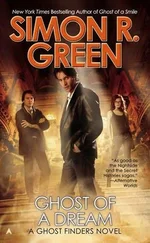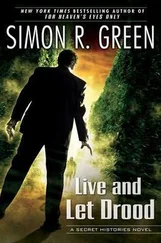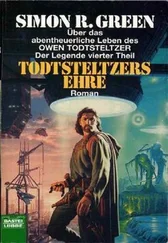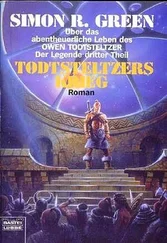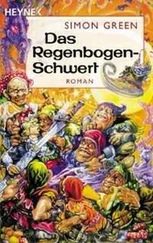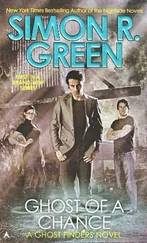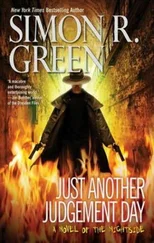“Of course. Artur from Sinister Albion was corrupted by his Merlin. For all his many qualities, Arthur was just a man. He could be swayed, turned, dominated by an outside force. Excalibur was never the most powerful weapon in Camelot; that was always Arthur. And as he goes ... so goes the world.”
“I never know whether we’re talking about history or legend when it comes to Arthur,” I said. “Most of the stories say he was taken away, to sleep in Avalon.”
“What is Avalon?” said Sir Gareth. “Only a name. In the whole existence of our order, we’ve never found any place or any land called Avalon. No-one knows where Arthur is. And before you ask, no, he couldn’t be in Shadows Fall. That’s where legends go to die when the world stops believing in them; and the world still believes in Arthur. But now Excalibur has come back into the world, the chase is on. Everyone will be after Arthur; and it’s vital for the good of everybody that we get there first.”
I didn’t say anything. But I did wonder if perhaps certain elements inside the London Knights might not prefer it if Arthur were to stay sleeping, even if found. That they might even take steps to ensure he never awoke. Because if he did, would he approve of what the London Knights had become? Of all the things they’d done, and made of themselves, in the fifteen hundred years since Logres? They may have meant well; but we all know what road is paved with good intentions.
We moved on, into the Hall of Forgotten Beasts. A long hall whose walls were decorated with the severed, stuffed, and mounted heads of fantastical creatures that were no longer a part of history. The only remaining examples of hundreds, maybe thousands, of exotic beasts. I walked slowly past row upon row of glassily staring, slack-jawed heads. Some I recognised, some I’d heard of, and some that were perhaps completely unknown now, outside of Castle Inconnu.
“For a long time, hunting was a central part of knightly tradition,” said Sir Gareth. “We don’t do it any more, of course. We’re all conservationists now. But we still take a pride in this hall. It took brave men to hunt these beasts and bring them down.”
I didn’t say anything, walking on and on past the dead heads of once-noble creatures. I had no doubt many of them had been man-killers in their day; but it still seemed to me that slaughter, no matter how necessary, shouldn’t be something you took a pride in. You did it because it needed doing, not because you had a gap on your trophy wall. It was only a step from there to mounting the heads of your enemies on spikes over your door, where everyone could see them.
A unicorn’s head stared sullenly out from the wall, its skin still blindingly white though the curlicued horn was cracked from end to end. A gryphon, with a bullet hole left unrepaired in its forehead; a basilisk with no eyes; and a dire wolf with moulting fur, its jaws forever snarling defiance. And, protruding way out into the hall, a dragon’s head, at least fifteen feet wide, its scaled hide a dull bottle-green. The eyes were clearly glass and looked like no-one had dusted them in a while. I finally stopped before one head I didn’t recognise, and Sir Gareth stopped with me.
“This is the fabled Questing Beast. It eluded us for centuries though many knights went after it, tracking it all across Europe. Finally brought down by Sir Bors, in 1876. One shot, from four hundred yards.”
“How very sporting,” I said.
The Questing Beast’s head was an odd mixture of beast and bird. And perhaps it was my imagination, but to me the Beast looked old and tired and pitiful, and maybe even a little resigned. It had outlived the time it was meant for, and the menaces it understood, like swords and lances, and finally died from an attack it never even saw coming.
I looked back down the Hall of Forgotten Beasts, and it did not seem a place of pride to me. All I felt was a quiet air of melancholy.
“You have to understand,” Sir Gareth said defensively, “every beast here preyed on people. It was a knight’s duty back then to hunt these creatures down and protect the innocent from attack. No-one thought about preserving endangered species. These days we only hunt bad guys, the real monsters of the world.”
I looked at him thoughtfully. “Lots of monsters in the Nightside. You ever go hunting there?”
“I told you,” Sir Gareth said steadily. “We stay out of the Nightside.”
“Because Merlin was there?”
“It’s all about territory,” said Sir Gareth. “You should understand that, John.”
We moved on again and came to a long stone gallery where the walls were covered with long rows of framed portraits, reminders of those who’d fallen in service with the London Knights. There were hundreds of them, maybe even thousands, stretching away into the distance. The most recent were photographs, showing men of various ages, all striking the same stiff pose and determined smile. These gave way to black-and-white, then sepia prints, and finally to painted portraits, in the varying styles of the times. The same stiff pose, though, the same determined smile. All the way back to stylised images of the original knights of Arthur’s Camelot. Painted sometime after, I assumed, though of course I could be wrong. Merlin’s court was famous for its anachronisms. I stopped before one portrait.
“Kae,” I said. “Arthur’s stepbrother.”
“Yes!” said Sir Gareth. “You do get round, don’t you?”
“You have no idea,” I said. “Really.” And then I looked at him as a thought struck me. I looked back and forth, at all the images of the original Round Table. “These knights are all from sixth-century England. So how come they’re wearing suits of the kind of plate armour that didn’t arrive until hundreds of years later?”
“That was Merlin,” said Sir Gareth. “Remember, he could see the future as easily as he saw the past. He looked ahead, saw the armour, and knew a good idea when he saw one ... He presented the armourers with plans and designs, and next thing you know King Arthur and his knights had suits of armour that no-one else could match. That’s why they won so many victories ...”
“Is that all Merlin gave the knights?” I said.
Sir Gareth sighed heavily. “Who knows? So much was lost, so much was forgotten, after Camelot fell. By all accounts from that period, Arthur’s castle was full of wonders and glories, the greatest knowledge and science of that time, with marvellous devices and amazing inventions. All gone now.”
“What did happen, to the original Castle of Camelot?” I said.
“They burned it,” said Sir Gareth. “Mordred’s followers—in revenge for the loss of their leader. No-one was there to stop them; all the knights had gone off, to fight and fall at Logres. The women and children had just enough warning to get out, before Mordred’s bastards arrived. And afterwards ... the last occupants of Camelot scattered, first across England, and later Europe, telling stories that became legends, of the glory that was Camelot. Nothing of the castle survived, and all too soon no-one even remembered where it once stood.”
“You never found it while you were searching for Arthur?”
“We never looked,” Sir Gareth said simply. “The London Knights preserve the best of the old, and we live by long-established and revered traditions ... but we have chosen to look forward, not back. There’s enough needs doing in the present without obsessing on the past.”
We walked on, talking easily about this and that. It occurred to me that we’d been walking a long time without even a glimpse of the more civilised inner quarters. I was moved to wonder aloud exactly how big Castle Inconnu was.
“Hard to tell,” said Sir Gareth. “We’ve been adding to the old place for centuries, as our order grew larger, and we needed more living space for our wives and families. We’re as much a city as a castle when you get right down to it.”
Читать дальше
